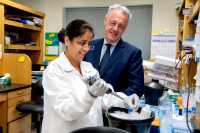
03 Oct Wistar Researchers Identify Mitochondrial Factor That Keeps Cancer Cells Alive
 MedicalResearch.com Interview with:
MedicalResearch.com Interview with:
Ekta Agarwal, Ph.D.
Postdoctoral fellow in the lab of
Dario Altieri, M.D.
Wistar president and CEO ,Director of the Institute’s Cancer Center
Robert & Penny Fox Distinguished Professor
and co-first author on the study.
MedicalResearch.com: What is the background for this study?
Response: Mitochondrial reprogramming is one of the hallmarks of cancer cell growth and metastasis. There are several studies correlating mitochondrial dynamics to increased cancer cell motility and invasion. However, therapies that can target molecular markers associated with mitochondrial functions and integrity are still obscure. Thus, it is crucial to identify novel targets and pathways that regulate mitochondrial functions in cancer. This study reveals one such mitochondrial molecular pathway which might serve as an actionable anti-cancer therapy.
MedicalResearch.com: What are the main findings?
Response: The major finding of this study is the identification of a crosstalk between mitochondrial dynamics and cell death pathways. We identified MYC, a commonly amplified oncogene, as a regulator of Mitochondrial Fission Factor (MFF) expression. Additionally, we also show that MFF associates with Voltage-Dependent Anion Channel-1 (VDAC1) at the outer mitochondrial membrane and disruption of this complex leads to activation of multiple mitochondrial cell death pathways and reduced tumor cell growth and proliferation in vivo.
MedicalResearch.com: What should readers take away from your report?
Response: MFF-VDAC1 complex regulates mitochondrial functions and integrity and might serve as an important therapeutic modality in cancer. Additionally, loss of MFF would lead to a disruption of this complex, thus leading to increased cell death, suggesting utility of MFF as a potential therapeutic target, specifically in MYC amplified tumors.
MedicalResearch.com: What recommendations do you have for future research as a result of this work?
Response: Further research will determine effect of MFF-specific inhibitors on MFF-VDAC complex formation and if inhibition of MFF would lead to increased cancer cell death and reduced tumor growth in vivo, especially in MYC-dependent tumors.
Citation:
Mitochondrial fission factor is a novel Myc-dependent regulator of mitochondrial permeability in cancer
Seo, Jae Ho et al.
EBioMedicine, Volume 0, Issue 0
https://www.ebiomedicine.com/article/S2352-3964(19)30615-2/abstract
[wysija_form id=”3″]
[last-modified]
The information on MedicalResearch.com is provided for educational purposes only, and is in no way intended to diagnose, cure, or treat any medical or other condition. Always seek the advice of your physician or other qualified health and ask your doctor any questions you may have regarding a medical condition. In addition to all other limitations and disclaimers in this agreement, service provider and its third party providers disclaim any liability or loss in connection with the content provided on this website.
Last Updated on October 3, 2019 by Marie Benz MD FAAD
